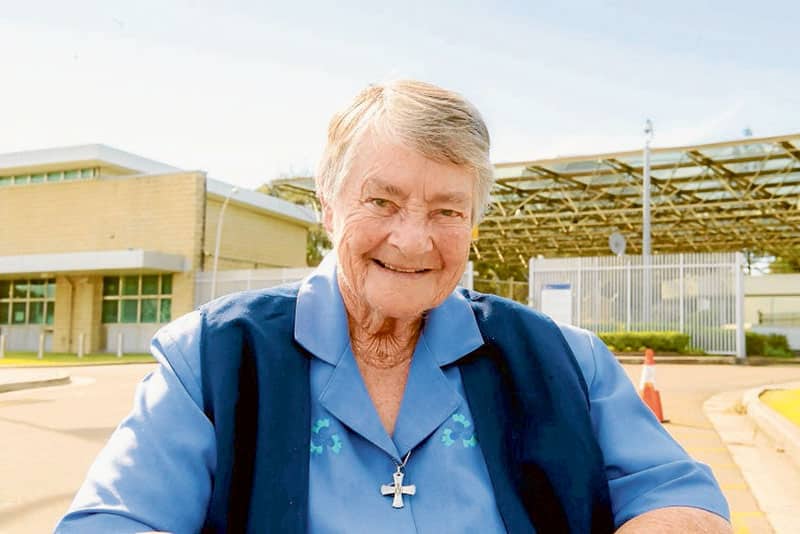
Long Bay: the words are synonymous in Australian life with prison and hard time, violence, drugs and all the worst that can emerge in human nature.
Yet one quiet-spoken religious – Marist Sister Therese Campbell – has done her own time inside this feared Australian jail for the past 14 years, serving as a chaplain to society’s outcasts and some of the nation’s worst criminals.
Despite the fearsome stories and individuals she’s encountered, she looks back on her work there as “the beautiful ministry;” a time and experience that has taught her some important things.
For one, far too many young offenders are going to prison, Sr Therese says.
Many of them are doing time after a rash decision made on a foundation of poor habits, mental illness, abuse or neglect, drug dependency, or a combination of them all, she says.
“They often get short sentences so they can’t work in jail and what do they do all day [but] learn a lot of things that they didn’t know beforehand,” said Sr Therese.
“There should be other ways of them paying for their misdeeds.”
Sr Therese lists mental illness and a dysfunctional upbringing as high on the list of factors that help put individuals in a cell. And she’s deeply disturbed by the high rates of Indigenous incarceration.
Illicit drug use is endemic and a scourge on society, she says. Backing her up, the latest Australian Bureau of Statistics figures show that while illicit drug offences are on the decline in recent years, they remain one of the most common types of crimes for offenders. But she believes delivering harsher sentences and tightening parole requirements across the board are not necessarily the answer.
“There is tremendous pressure from us, the community, to make life more uncomfortable in prison than it needs to be, and to come down with full force when rules are broken”
Sr Therese had a 43-year teaching career which she loved before embarking on the “beautiful ministry” of prison chaplaincy for CatholicCare, the Sydney archdiocese’s official welfare agency.
Working over the years in a minimum and maximum security jail, which houses more than 1300 men, she’s pretty much heard it all. Society’s most vulnerable are in jails, she says, but is still shocked by some stories that prisoners have shared with her.
At the same time, she has no illusions that – for some – prison is the best place.
“There are terrible crimes and people who do not deserve to be in society, but as soon as there is a major crime reported we jump up and down and say the laws are too easy and sentences too lenient,” she said.
The knock-on effect for all prisoners is unfair, she believes.
“There is tremendous pressure from us, the community, to make life more uncomfortable in prison than it needs to be, and to come down with full force when rules are broken,” she said. “Many think going to jail is like going to a holiday farm – and it’s far from it, I can tell you. To be deprived of your liberty is a terrible thing. There should not be further punishment.”
She’s full of praise for those who work in prisons, but has observed many inconsistencies and failures of the criminal justice system including the high recidivist rates. According to the NSW Bureau of Crime Statistics and Research, 41 percent of adults re-offend within 12 months of being released from prison while the rate is a dire 65 percent for juveniles.
Rehabilitation programs, including the self-development programs offered by chaplains, offer hope but funding them needs to be a priority.
“They have excellent results because they help people think of a different way of living, a different way of relating to others,” said Sr Therese, who “never once” felt frightened in prison and was offered a special blessing from prisoners at her farewell Mass.
“There’s great respect for religious women in prison. It’s an unwritten law that they have,” she said.
She found that starting conversations with new inmates was easy, given the respect afforded to her, boosted by her uncanny ability to remember people’s names and the guarantee of chaplain-inmate confidentiality.
Over time she nurtured many friendships, including some people with life sentences or who she saw return to jail again and again. While she cherished these friendships, they were always tinged with the sadness of knowing that here was the potential of a full life, interrupted.
One woman she befriended who was pregnant in prison called her ‘Mother Teresa’.
“I was very affected, because these relationships brought out the little bit of goodness that was there,” she said. “It never matured as they grew up but it’s there.
“I was always very much aware of ‘There but the grace of God go I’. I was privileged to have had a good upbringing and parents who wouldn’t let me get away with anything. Without that foundation and the privileges we have had people’s lives are topsy-turvy.”
